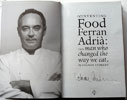Reinventing food
Ferran Adria: THE MAN WHO CHANGED THE WAY WE EAT. by COLMAN ANDREWS (with small phaidon symbol at the bottom of the page).
FIRST EDITION 2010. 240x160 mm. 1fep. Half-title. On verso, photograph of Adria. Title page with Coleman Andrews signature. Verso with symbols in b/w for elBulli foodstuffs. 1p Contents, [1] 7-10 Author's note. 11-22 Introduction. 2p Photographs of Adrian and elBulli. 25-340. b/w photograph of a young Adria. 342-346 Bibliography. 347-350 Acknowledgments. 351-359 Index. [1] 1fep. Grey hardcover with black & red text on front, back and spine. As new inside and out.
- There are some things that are disagreeable as well as interesting about this book. The disconcerting title for one thing. Adria has not changed the way we eat. The guests at his reatuarant 'elBulli' (now closed since 2012) all ate food the same way as everyone else, even in a McDonalds. That is with fingers or a container, a plate, spoon, glass or bowl etc etc. What you can definitely say is that Adria has changed what we eat. The absoluteness of Andrew's title also conveys a sense of Adria's already, far-reaching influence. The chefs who trained with him and who have spread his gastronomic ways are just beginning to make names for themselves in their own right, and Adria's influence is still only growing. The influences of great Cooks and their cookery books, such as Bartolomeo Scappi, Careme, Irma Rombeaur, Escoffier, Elizabeth David and Fernand Point are much more fundamental. What can be agreed is that Ferran Adria's cuisine is a very big gastronomic change from that of the preceding time. Along with food de-constructors and authors like Blumenthal, Redzepi etc, whose changes and innovations are also being recorded in print, we see reactions, positive or negative being expressed with vigour. It does not seem that ambivalence is an option. As always, time will tell whether Adria's cuisine is epoch changing. He will always have critics because a large part of the population are not gastronomically educated, nor have the cash nor luck with a dinner booking to try the more progressive places like 'elBulli' in Spain, or Blumenthal's 'Fat Duck' in UK and Redzepi's 'Noma' in Copenhagen, in which those Chefs are very serious about what they are attempting and offering. There will always be a broad majority of people with good and educated palates who will want the very fresh prawns with a touch of salt of the restaurant 'Inopia' written about in Andrew's introduction. They are what you may call the 'naturists' - who want their fresh food from air, sea and land to the table as quickly as possible with a minimum of fuss in the preparation, cooking and serving, while at the same time tasting exquisite. This is a prime sentiment of Adria's as well; it is no coincidence that his 'elBulli' experimental kitchen and workshop is just across the Ramblas from the great Barcelona market, La Boqueria. There is much about Adria that is likeable, not least in this age of Chef's egos, his unassuming manner, but one thing that persists when assessing him, is his penchant for self-promotion and his ability to market his cuisine, all in a manner reminiscent of Alexis Soyer. Because of this we can be sure Ferran Adria will never be forgotten and one thinks that his influence will grow and be extensive, possibly coming close to matching Andrew Coleman's premature assessment. We can only eat, wait and see.



click on image to enlarge

Modern category
ref number:
11173